Self-Hosting Guide to Alternatives: Google Analytics
Self-hosted alternatives for the popular web analytics platform

Google Analytics is a popular online service deployed to collect web analytics, metrics, and behaviors for analytical, performance, and marketing purposes. However, as with most Google tools (and despite their efforts to be straightforward with how they use the data collected by Analytics), many users and enterprises still seek alternatives that pose less of a threat to their sensitive and potentially competitive data.
Fortunately, a number of privacy-conscious alternatives exist that can be self-hosted and deployed for tracking web analytics on just about any site.
Umami
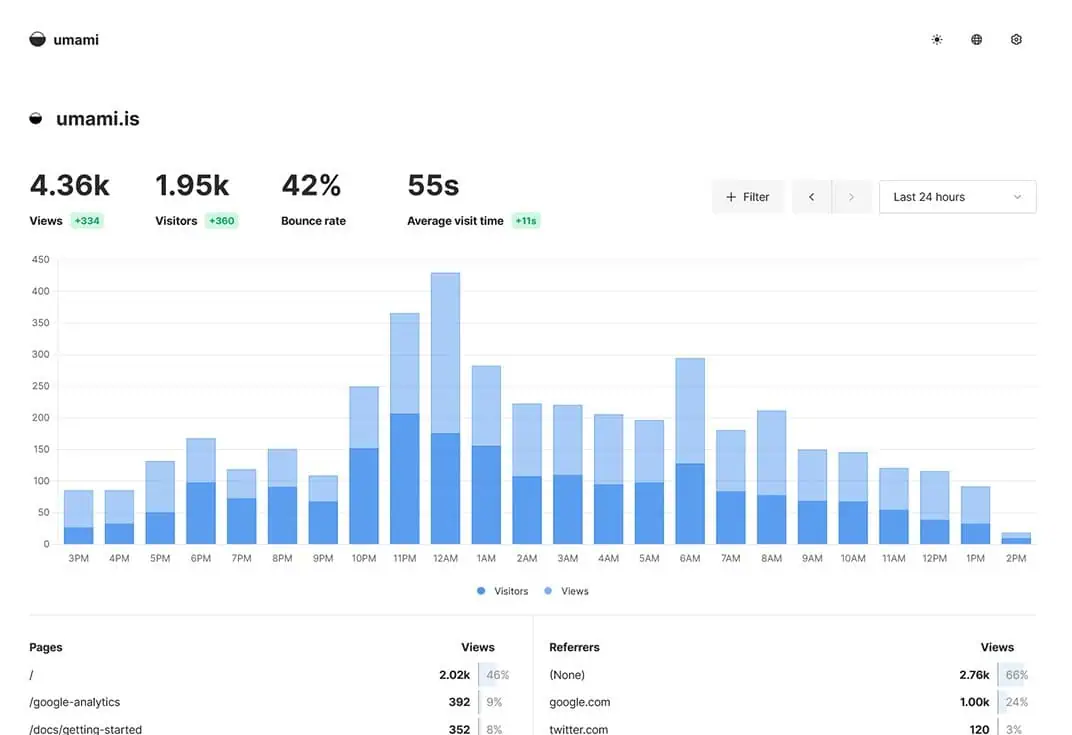
Umami is a no-frills Google Analytics alternative focused on speed and simplicity. The software features a clean and minimal web interface with a prominent and configurable bar chart for viewing and filtering visitor statistics over several periods of time (last day, week, month, custom, etc.). Other statistics (both summary and realtime) include specific page visits, referrers, device info (browser, operating system, and device), country, and configurable event data based on clicks.
The platform supports multiple users and teams for provisioning access to sites and has focused several of its latest releases on increasing reporting capabilities (which are currently a bit basic). To track analytics using Umami, users are given a JavaScript snippet to include in their site's HTML headers.
Umami can be easily deployed and provides documentation for installation via bare metal or container options (including database-specific images) for those who prefer Docker.
Matomo
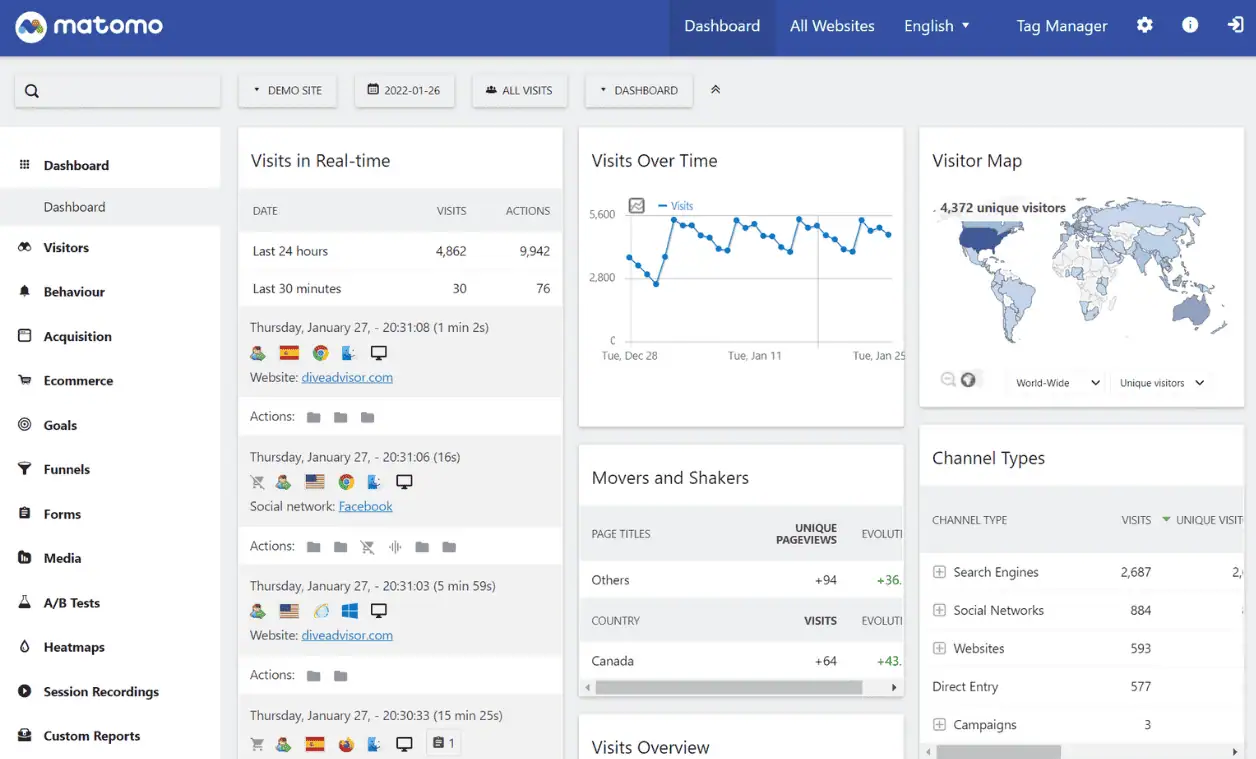
Matomo is a popular alternative with marketing that leans heavily into its existence as an ethical solution to hosted analytics services. The platform has been around since 2007 and boasts a large feature set more similar to Google Analytics than many of the other alternatives, which includes tracking visitor statistics, behavior, ecommerce insights, funnels, tags, heatmaps, keyword SEO reporting, A/B testing, and more.
The trade-off for the vast array of features, however, is Matomo's heavier resource usage and dashboard – which is a bit clunkier than the others and may feel cluttered at times (which can be oddly reminiscent of Google Analytics' interface). Similar to the others, tracking analytics with Matomo is as simple as injecting a tracking code into a site's HTML headers.
The Matomo team provides robust documentation for those looking to self-host the software on premise (including a dedicated Docker project) as well as a ton guides for improving performance and easily migrating from Google Analytics.
Plausible
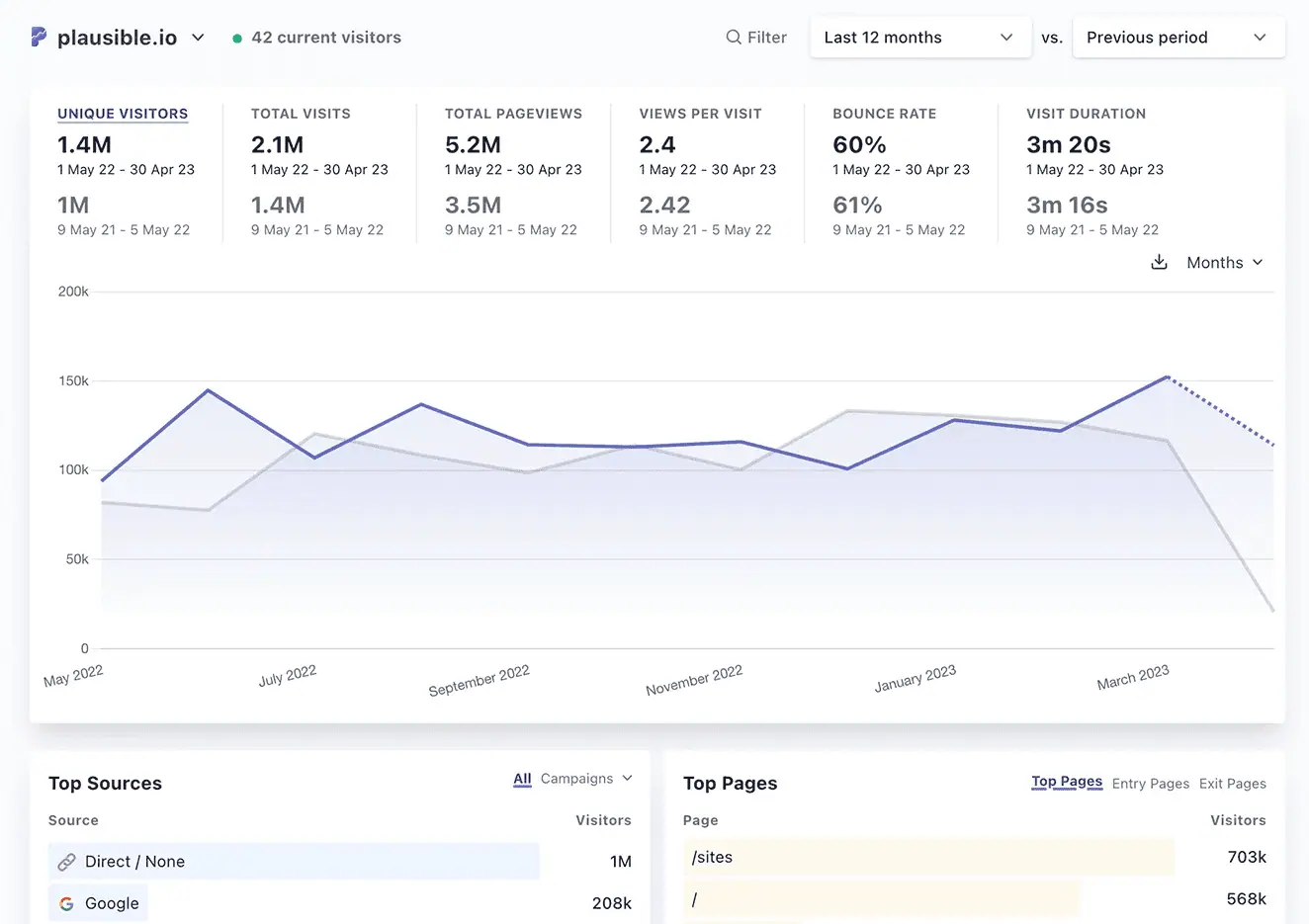
Plausible is another behemoth in the world of Analytics alternatives and presents itself as a simple, lightweight option for users looking to make the switch. The software's feature set is much smaller than Matomo's (which it isn't shy about in its own Plausible vs Matomo comparison) and prioritizes website statistics and metrics over some of the other marketing features found in Google Analytics.
Plausible's dashboard is more similar to Umami's than Matomo's with a heavy emphasis on a featured chart alongside high-level stats that provide helpful overviews at a glance. The software's marketing also leans heavily into its lightweight tracking code, which it claims is smaller than 1 KB in size and less likely to negatively impact page load speed than other platforms' tracking codes.
Plausible offers a community edition with Docker-only support for those looking to deploy the project on their own hardware. Alongside a SQL-compatible database, users will also need to spin up an instance of ClickHouse for reporting queries and capabilities.
Swetrix
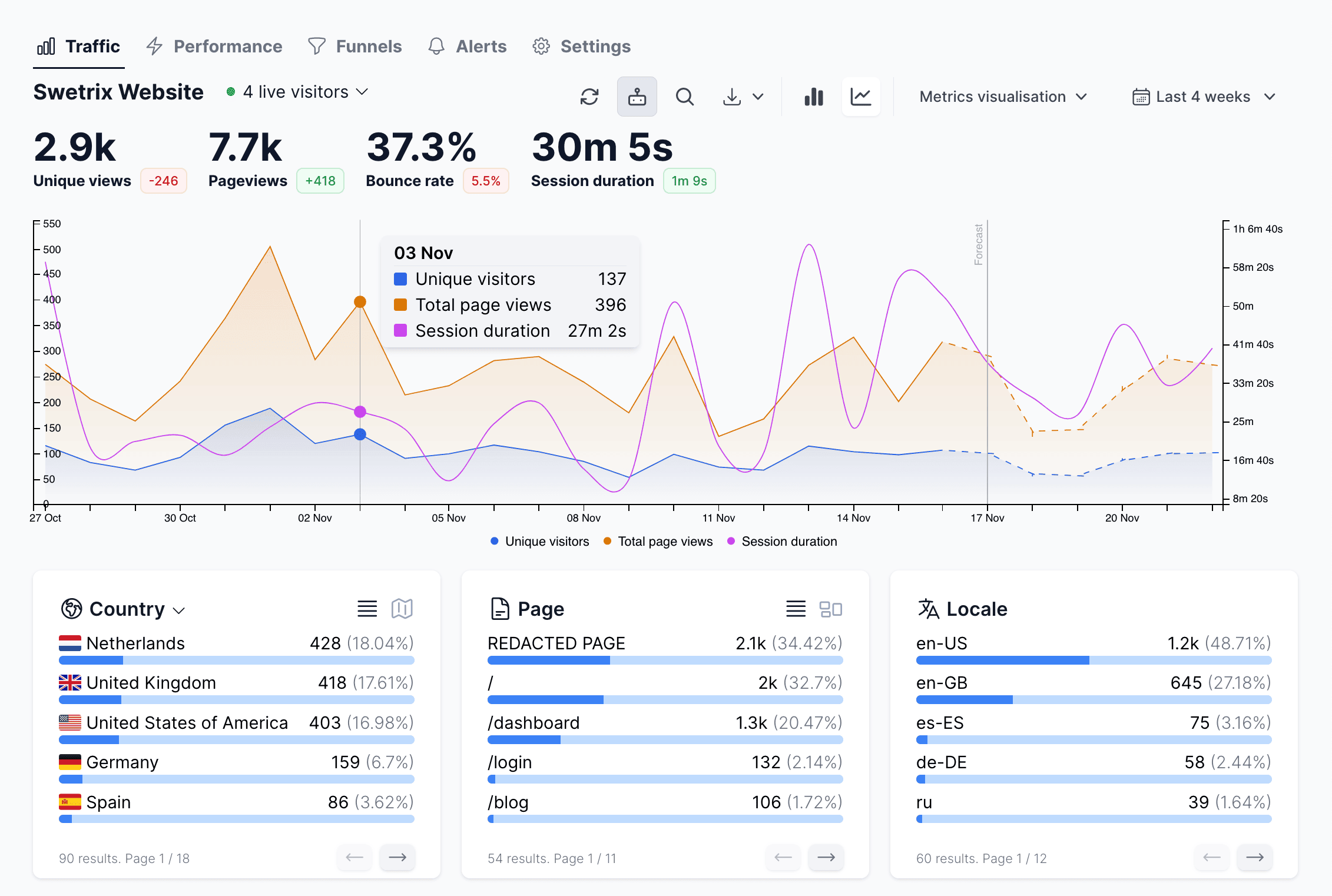
Swetrix is a privacy-focused Google Analytics alternative that provides essential features while also maintaining a lightweight footprint with a tracking script <5kb in size. The platform is most akin to Plausible, although a comparison on the software's website points out a number of additional features including two-factor authentication, support for session tracking, performance monitoring, and a marketplace for custom extensions.
Swetrix's interface sports similar KPIs and visualizations to its counterparts, with a focus on key header metrics and a configurable chart that provides insight into recent trends. Despite these similarities, the dashboard at times can feel a bit cluttered at a glance (although it makes up for this with a stunning dark theme).
Alongside a cloud offering, the Swetrix team offers a self-hosted version of the software and provides detailed documentation for deploying the project via Docker. The installation includes two Swetrix containers (API and frontend), Redis for caching, and Clickhouse for analytics and transactional data storage.
PostHog
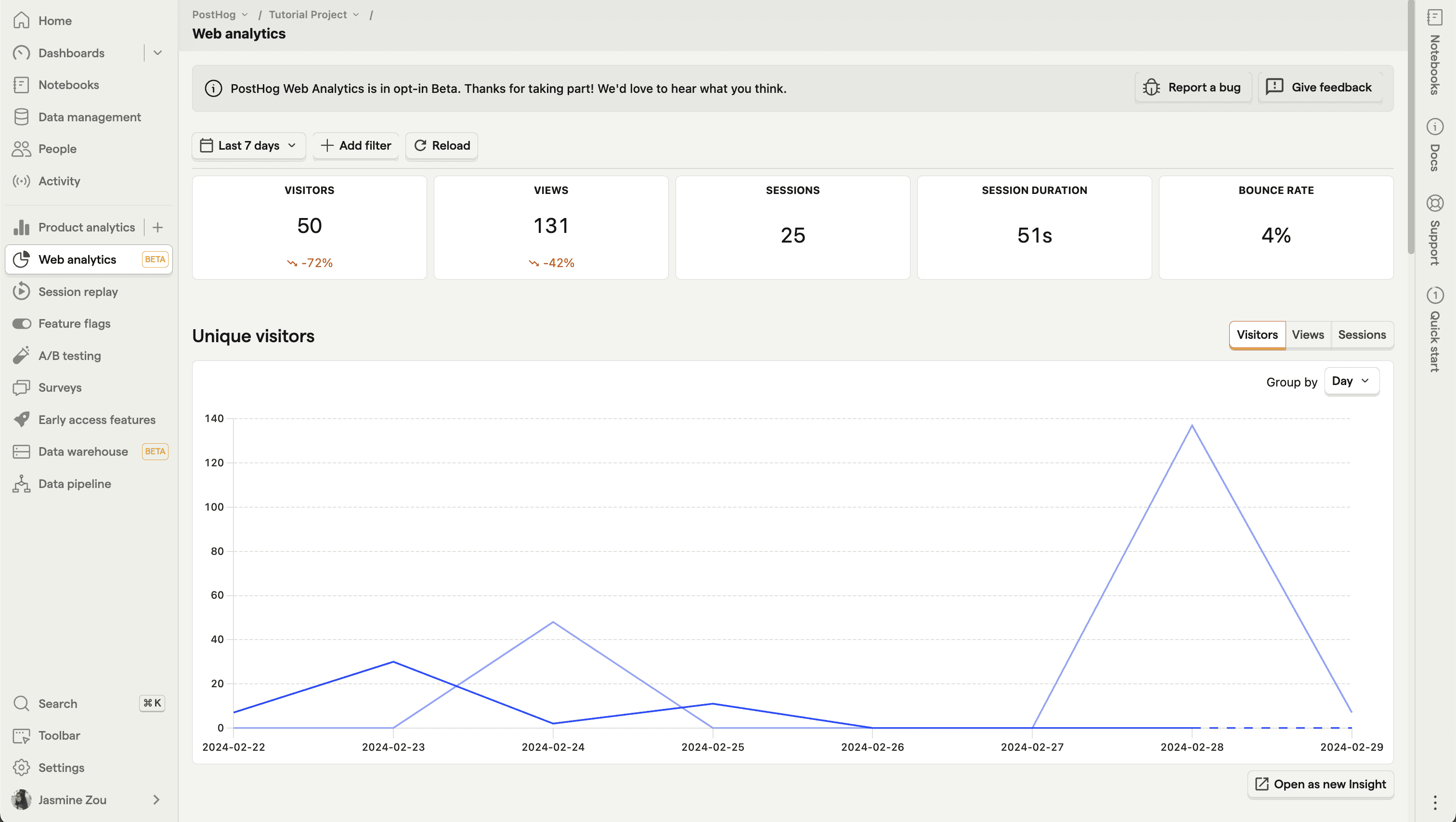
PostHog is marketing feature-rich alternative to Google Analytics, most akin to Matomo with support for features like product analytics, A/B testing, session replay, and feature flags alongside web analytics. As of the time of writing, the platform's page boasts itself as "8+ products in one".
Unlike Matomo, however, PostHog seems to have struck a better visual balance between its dashboard and the amount of features it offers – even if it isn't the prettiest interface to look at. PostHog's tracking capabilities also rely on a much beefier JavaScript snippet pasted into a site's HTML headers to accommodate its various capabilities.
PostHog provides an MIT-licensed self-hosted version for those looking to deploy the platform on their own, but does limit its feature set in an effort to push users to its cloud hosted offering. The deployment process may also be a bit daunting given the number of containers required for full functionality.
Honorable Mentions
The alternatives listed above are among the more popular and mature solutions available to users looking to self-host their own web analytics – but they're not the only options. Below are some additional alternatives that weren't covered in this article but are still worth checking out.
What did I miss?
Did I miss anything? Feel free to reach out using any of the communication methods listed on the site's contact page to get in touch.


Comments